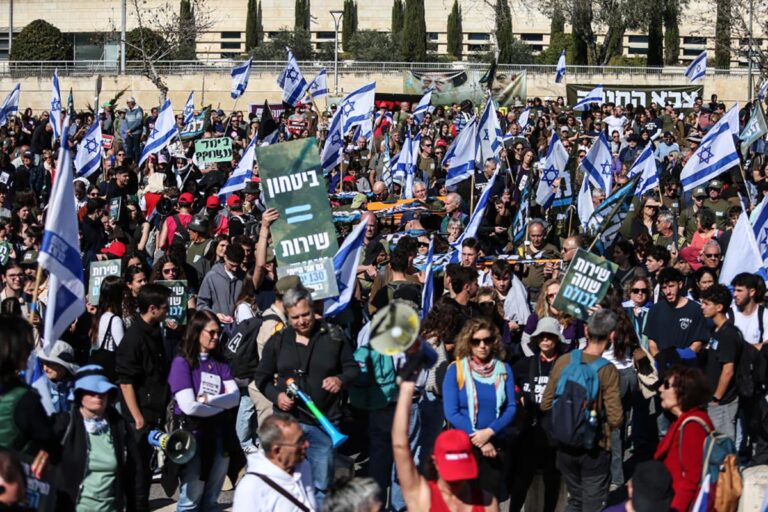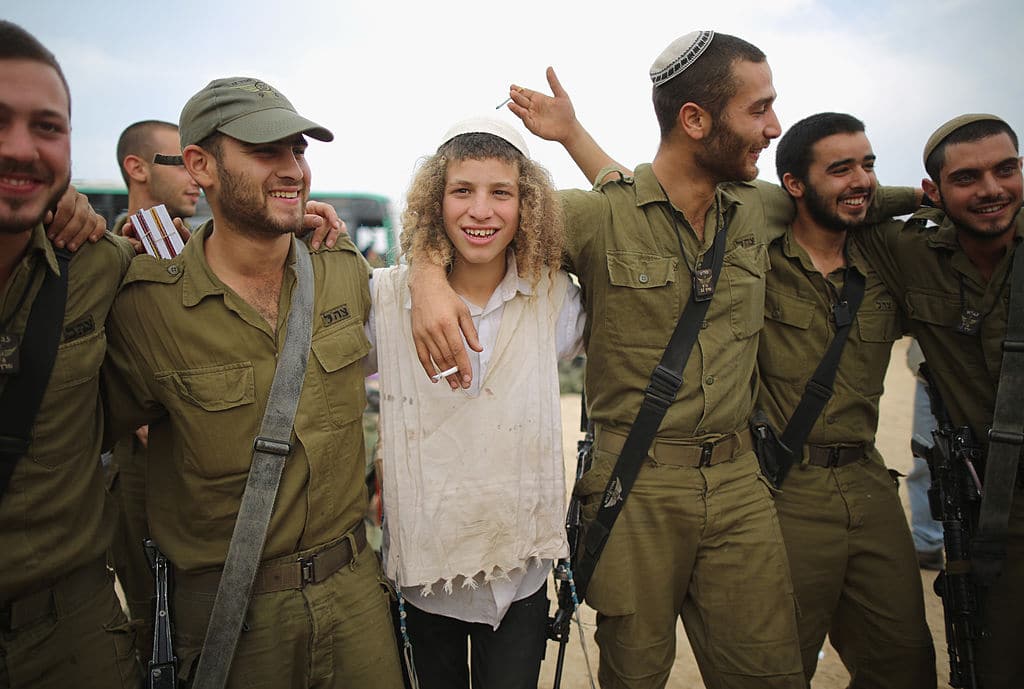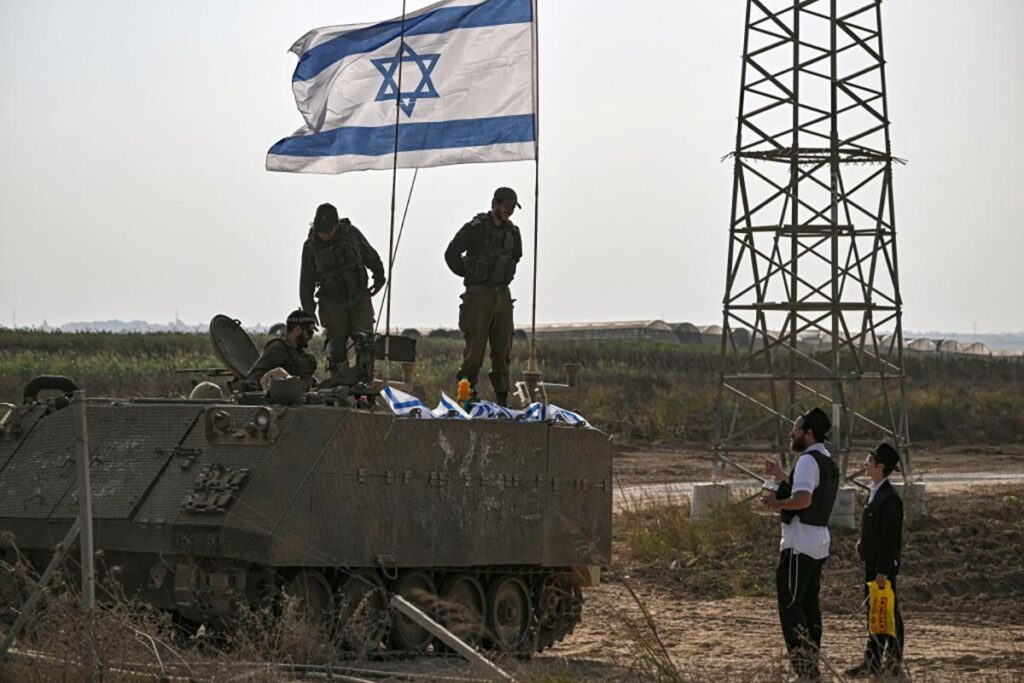
As the war in Gaza continues, Israel’s government faced turmoil on Thursday when the High Court of Justice announced that the government could no longer defer the conscription of Haredim to the military and must stop funding yeshivas where undrafted Haredim study.
This announcement followed the government’s failure to agree on a new law to regulate the draft exemption that has been granted to Haredim since the state’s establishment. Haredi MKs insisted on maintaining the blanket exemption, while other government members are calling for change.
The discussions surrounding the law have sparked outrage from much of Israeli society. Many argue that the law would mean Haredim would not equally “bear the burden” of protecting the country, especially amid the ongoing Israel-Hamas War.
Let’s unpack the intensifying debate surrounding this law and why it has sparked such intense emotions within Israeli society.
Who is required to serve in the IDF?

In Israel, all citizens are legally required to register for the draft at the age of 18, though not all are ultimately drafted into the military.
Exemptions are granted for various reasons, including to married women and mothers, individuals with specific medical conditions, women who observe Shabbat and keep kosher, and Arab Israelis, among others.
Despite not fitting into one of the standard exemption categories, Haredi yeshiva students typically receive a “deferral” from military service, allowing them to avoid the draft by declaring that “Torah study is his work” and demonstrating full-time study in a yeshiva.
This arrangement, which has been in place since the state’s founding, was initially agreed upon by Israel’s first prime minister, David Ben-Gurion, to exempt a few hundred students.
Since then, however, the number of Haredi youth who use the arrangement has surged from a few hundred to tens of thousands, leading to increased criticism from other Jewish citizens who are required to serve.
For a deep dive into the history of why Haredim aren’t required to serve in the IDF, listen to our “Unpacking Israeli History” podcast.
In short, the Knesset tried several times to pass laws that would regulate exemptions for yeshiva students, while also encouraging increased enlistment, but all these efforts failed.
Why is the draft exemption becoming a central issue again?

In 2019, debates surrounding the law contributed to the dissolution of the 20th Knesset, leading to a series of successive elections and short-lived governments.
Since then, discussion of the issue somewhat abated, until the start of Prime Minister Benjamin Netanyahu’s current government.
As Netanyahu’s new government was being formed, the Likud Party signed agreements with Haredi parties to pass a law exempting yeshiva students from the draft.
The issue was temporarily sidelined due to the Oct. 7 attacks and the war in Gaza, but resurfaced in February 2024 when Israel’s Defense Ministry proposed laws to increase IDF service length due to manpower shortages.
The announcement sparked outrage and renewed the conversation about requiring Haredim to draft, as opponents argued that the manpower shortage could easily be dealt with by requiring Haredim to share the load.
The debate intensifies

The conscription conflict escalated on Thursday when the court ruled that the government could no longer defer the conscription of Haredim to the military and must stop funding yeshivas where undrafted Haredim study.
The previous law regulating the exemption for Haredim expired in June 2023, technically requiring the IDF to begin drafting Haredim. However, the government approved a decision not to draft them while working on a new law.
A complaint against the decision was filed with the High Court, which gave the government until this past Wednesday to explain why it should be allowed to defer the draft of Haredim.
Efforts to reach an agreement on a new bill were unsuccessful, despite meetings between Prime Minister Netanyahu, government officials, and Haredi party leaders. Haredi leaders warned that any bill with recruitment quotas or financial sanctions could cause them to leave the government.
The final deadline for a decision is March 31, when the current government order not to draft Haredim expires.
Late Wednesday night, Attorney-General Gali Baharav-Miara informed the High Court that, due to the impasse, preparations would need to begin to draft yeshiva students and cut off government funding to Haredi yeshivas starting Sunday. The attorney general stated that the funding cuts would be gradual.
How the government could actually conscript the tens of thousands of Haredim who would need to be drafted remains unclear. Some Haredi leaders are warning that young men would prefer jail over enlistment, and previous attempts at limited enlistments have led to protests and riots.
If the government proceeds with drafting Haredim, it could prompt Haredi parties to leave the government, potentially leading to a coalition collapse and new elections.
Diversity of perspectives: Should Haredim be required to serve in the army?
Haredi MKs and leaders argue that the exemption for Haredi yeshiva students is a fundamental right agreed upon since the state’s founding and that Torah learning is essential to the continued existence of Israel.
Haredi MKs have also expressed concerns that IDF service could pull young men away from their community.
In 2022, UTJ MK Yisrael Eichler stated in the Knesset plenum, “There is a matter of compulsory conscription in a country that instills a bad culture. We will never agree to transfer our children to the bad culture that prevails in the State of Israel.”
“We recognize the fact that the state was established as a secular state, and we do not expect it to be religious,” Eichler continued. “But as such, it cannot put our children into a melting pot that will turn them into secularists, just as the secularists will not agree to forcibly bring their children into the Haredi melting pot and they will become Haredi.”
The opposition in the Knesset and anti-judicial reform protest movements have been vocal against the draft exemption law.
National Unity party leader, Benny Gantz, who joined the government as a temporary member as part of the war effort, warned he would resign from the government if the new law doesn’t include stricter drafting measures for Haredim.
“We want agreements — but those that will bring a fair solution to recruitment for the service of all. We want a solution for recruitment, not an exemption from recruitment,” Gantz said on Monday.
Gantz has demanded that any new law on the conscription of Haredim include limits on how many yeshiva students can be eligible for exemptions. He has pushed for a new national service outline that will integrate Haredim and Arab Israelis into the IDF and national service.
For the past year, a protest movement called Mothers at the Frontline has demonstrated against the blanket exemption for Haredi yeshiva students, demanding equal service obligations. “We will no longer agree to discrimination between blood and blood and we will fight to the bitter end against the law of ‘his Torah is his draft dodging,’” the group said.
Even within the coalition, some members oppose a blanket draft exemption. Several Likud party members, including Gallant, have expressed opposition to the proposal.
Gallant stated that he will only support legislation that is agreed upon by the entire government, including Gantz. On Monday, he told Israeli media: “My position has not changed. I will not be a party to any proposal that isn’t agreed upon by all coalition factions — and under my leadership, the defense establishment will not submit it for legislation.”
Originally Published Mar 27, 2024 07:55PM EDT
